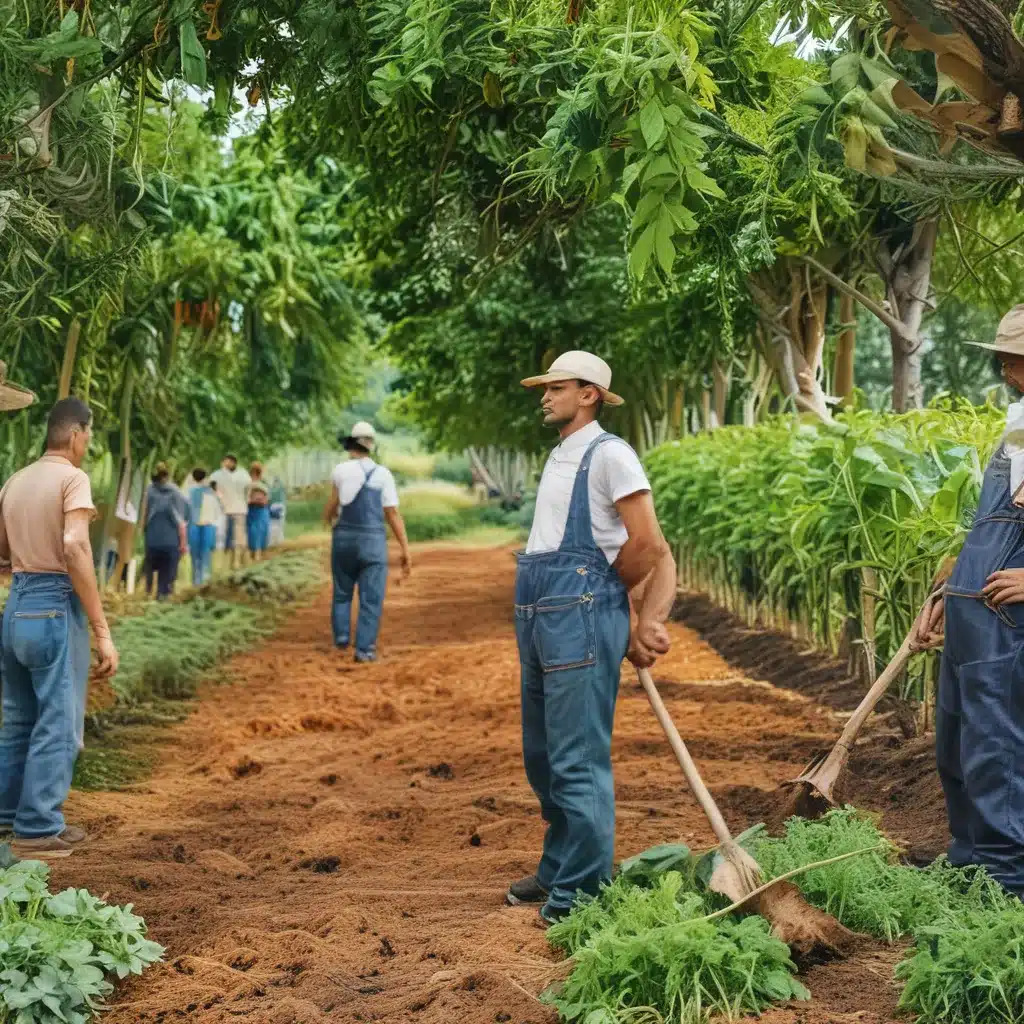
Embracing the Paradox: Unlocking the Power of Organic Farming
As I strolled through the lush, verdant rows of my community-supported agriculture (CSA) farm, I couldn’t help but marvel at the intricate dance unfolding before my eyes. Vibrant vegetables sprouted from the soil, their leaves rustling in the gentle breeze, while a symphony of buzzing insects and chirping birds filled the air. It was a scene of remarkable balance and harmony – a far cry from the industrial monocultures that had once dominated the landscape.
You see, I’ve always been fascinated by the power of organic farming to redefine our notions of productivity. It’s a tale of paradox and possibility, where the very act of working in harmony with nature can yield remarkable economic and ecological gains. And as a member of the Thornappple CSA, I’ve had a front-row seat to this transformative shift.
Challenging the Conventional Wisdom
For years, the dominant narrative in the agricultural industry has been one of constant optimization and efficiency. Farmers were told that the key to success lay in maximizing yields, minimizing costs, and leveraging technology to eke out every last drop of productivity. And to a certain extent, this approach has delivered impressive results, feeding a growing global population and fueling economic growth.
But as research from the European Environment Agency has shown, this single-minded pursuit of productivity has come at a steep cost. The intensification of agriculture has led to widespread environmental degradation, from soil erosion and biodiversity loss to soaring greenhouse gas emissions. And paradoxically, despite producing more food than ever before, the world is still grappling with issues of food insecurity and malnutrition.
It’s a sobering realization that has led many to question the fundamental assumptions underlying our agricultural system. And it’s here that the power of organic farming shines through, offering a fresh perspective on what true productivity really means.
Cultivating a New Vision of Productivity
At the heart of organic farming is a deep respect for the intricate web of life that underpins our natural ecosystems. Rather than seeking to dominate and control nature, organic farmers embrace the idea of working in harmony with it. They eschew the use of synthetic fertilizers and pesticides, instead relying on techniques like crop rotation, cover cropping, and integrated pest management to build soil health and foster biodiversity.
The results are nothing short of remarkable. Studies have shown that organic farms can be just as productive as their conventional counterparts, while also delivering significant ecological benefits. By nurturing the soil and supporting a thriving web of life, organic farmers are able to maintain long-term fertility and resilience, all while reducing their environmental footprint.
But the true power of organic farming lies in its ability to redefine our very understanding of productivity. Rather than focusing solely on maximizing yield, organic farmers recognize that true productivity is about much more than just the bottom line. It’s about cultivating a system that is economically viable, ecologically sustainable, and socially equitable.
Embracing Multifunctionality
At the Thornappple CSA, we’ve seen firsthand how this multifunctional approach to agriculture can pay dividends. By diversifying our crops, integrating livestock, and investing in soil-building practices, we’ve been able to not only maintain our productivity but also enhance the overall health and resilience of our farming ecosystem.
And the benefits extend far beyond the farm gates. A circular economy for food, built on the principles of organic farming, can unlock a host of economic and ecological gains – from reduced waste and greenhouse gas emissions to the creation of new, meaningful jobs within local food systems.
But perhaps most importantly, this shift in mindset has empowered us to see our role as not just producers of food, but as stewards of the land and guardians of our community’s well-being. By prioritizing ecological health and social equity alongside economic viability, we’re able to create a more holistic and sustainable vision for the future of agriculture.
Fostering Resilience in an Uncertain World
Of course, the path to this kind of transformation is not without its challenges. The industrial agriculture system is deeply entrenched, and the pull of short-term profits can be hard to resist. But as we’ve seen time and time again, the true measure of success lies not in the quarterly earnings, but in the long-term resilience and adaptability of our food systems.
And as the world grapples with a perfect storm of crises – from climate change and biodiversity loss to geopolitical instability and supply chain disruptions – the value of this resilience has never been more clear. By embracing the principles of organic farming, we’re not only safeguarding the health of our planet, but also inoculating ourselves against the shocks and stresses that threaten to destabilize our food systems.
A Call to Action
So, as I stand amidst the vibrant tapestry of life that is my community-supported agriculture farm, I can’t help but feel a sense of profound optimism. Because in the face of seemingly insurmountable challenges, the power of organic farming to redefine our notions of productivity offers a glimmer of hope.
It’s a vision that transcends the limitations of conventional thinking, one that sees agriculture not as a purely economic endeavor, but as a vital part of the interconnected web of life that sustains us all. And by embracing this holistic approach, we can not only safeguard the health of our planet, but also unlock a future of greater prosperity, resilience, and community for all.
So, I invite you to join me in this journey of rediscovery. Explore the Thornappple CSA and witness firsthand the transformative power of organic farming. Because when we redefine productivity, we don’t just grow better food – we grow a better world.



